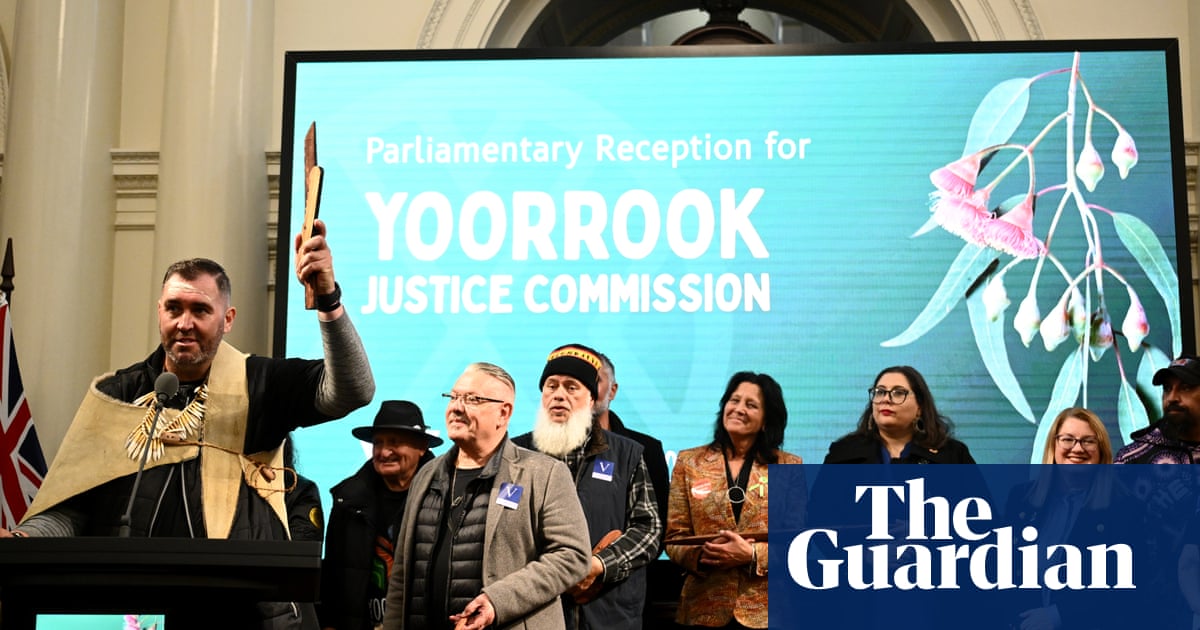Australia’s first truth-telling inquiry has labelled the injustices experienced by First Nations people inVictoriaa “genocide” and urged the state government to provide redress for injustices from “colonial invasion”.
The Yoorrook Justice Commission’s final report was tabled in the Victorian parliament on Tuesday, and made 100 recommendations aimed at truth telling, healing and reconciliation. The recommendations relate to a range of institutions including health, education, the justice and child protection system.
The report found that from 1834, mass killings, disease, sexual violence, the destruction of languages and cultures, and child removals from families and communities combined to “bring about the near-complete physical destruction of First Peoples in Victoria”.
Indigenous peoples in Victoria were “decimated”, with the report stating: “this was genocide”.
The treaty commissioners called on the Victorian government to provide redress for injustices that occurred during and as a result of invasion, including the loss of traditional lands, waters and natural resources. Redress should take the form of monetary compensation, including tax relief or other financial benefits as negotiated through treaty, the report found.
The report examined the impact and trauma of colonisation through testimony from 67 days of public hearings, more than 200 witnesses, 1300 public submissions and more than 10,000 public documents.
The final report outlined injustices stemming from colonisation, including massacres, destruction of culture, language, land loss, as well as the over-representation of Indigenous children in out-of-home care and detention.
The report details deaths stemming from 50 massacres recorded between 1831 and 1854, in which at least 978 Aboriginal men, women and children were killed. All but three of the massacres were committed by colonisers, with one perpetrated by Aboriginal people against settlers and two others committed by and against First Nations people.
The commission is urging the Victorian government to establish a truth-telling body to continue building a public record as a key priority.
It also called for the Victorian education department to embed Indigenous representation and perspectives within the curriculum and ensure schools are culturally safe for students.
The four-year inquiry was not without criticism or controversy, with severalcommissionersquitting or exiting during the probe.
The commission’s deputy chair, Travis Lovett,led a 486km “walk for truth”from Portland on the state’s south-west coast, arriving atstate parliament last month. Hundreds of people joined the final stage of the journey.
But notably, three commissioners – deputy chair Sue-Anne Hunter, a Wurundjeri and Ngurai Illum Wurrung woman and adjunct professor at Federation University; University of Tasmania professor and Palawa woman Maggie Walter; and former federal court judge and chair of the Victorian Law Reform Commission Anthony North, a non-Indigenous man – did not.
According toNine Newspapers, Hunter, Walter and North considered writing a dissenting report but instead agreed to a compromise.
In the report commissioners Walter, Hunter and North made their dissent clear, noting they “did not approve of the inclusion of the key findings in the final historic record. They urged readers read the report’s findings along with Yoorrook for Justice (2023) and Yoorrook for Transformation (2025).
They said that the work of Yoorrook was just beginning with “much more work to be done”.
Co-chair of the First Peoples’ Assembly, Rueben Berg, said Yoorrook’s final report revealed the wide-ranging impact of colonisation and how treaty could underpin change.
“Truth and treaty go hand-in-hand,” the Gunditjmara man said.
“Treaty will acknowledge our shared history and be an agreement between First Peoples and the Victorian Government on how we move forward together to help right past wrongs,” he said.
“Victorians know that we can’t keep doing the same thing and expecting different results. When it comes to issues facing First Peoples, we need a different approach, one that draws on the expertise of First Peoples to design and deliver practical solutions to local challenges.”
The state government said it was carefully considering the commission’s final findings and recommendations.
The Victorian premier, Jacinta Allan, acknowledged the “immense undertaking” of commissioners and staff during the Yoorrook reports and the thousands that submitted or gave evidence in the inquiry.
“Victoria’s truth-telling process is a historic opportunity to hear the stories of our past that have been buried – these are stories that all Victorians need to hear,” Allen said.
